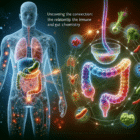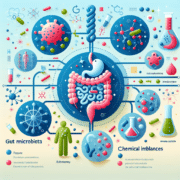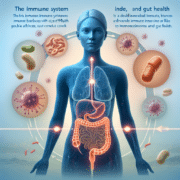"Uncovering the Connection: The Relationship Between Immune System Function and Gut Chemistry"
Exploring the Immune System-Gut Chemistry Connection
As a holistic wellness healthcare specialist, it is important to understand the intricate relationship between immune system function and gut chemistry. Research has shown that the health of our immune system is closely tied to the health of our gut, and vice versa. In this article, we will uncover the connection between immune system function and gut chemistry, and explore how you can optimize both for overall well-being.
The Basics: Understanding the Immune System
The immune system is a complex network of cells, tissues, and organs that work together to defend the body against harmful pathogens, such as bacteria, viruses, and parasites. When functioning properly, the immune system can identify and destroy these invaders, keeping us healthy and free from disease.
- There are two main types of immune responses: innate immunity and adaptive immunity. Innate immunity is the body’s first line of defense, providing immediate, non-specific protection against pathogens. Adaptive immunity, on the other hand, is a more targeted response that develops over time as the body is exposed to specific pathogens.
- Key components of the immune system include white blood cells, antibodies, and lymphoid organs such as the thymus and spleen.
- An imbalance in the immune system can lead to chronic inflammation, autoimmune disorders, and increased susceptibility to infections.
The Gut Microbiome: A Key Player in Immune Health
The gut microbiome refers to the trillions of bacteria, fungi, and other microorganisms that reside in the digestive tract. These microbes play a crucial role in maintaining gut health, digestion, and overall well-being. Research has shown that the gut microbiome also has a significant impact on immune system function.
- The gut microbiome helps regulate immune responses by interacting with immune cells in the gut lining.
- Imbalances in the gut microbiome, known as dysbiosis, have been linked to various immune-related conditions, including allergies, inflammatory bowel disease, and autoimmune disorders.
- ProbioticsProbiotics are live microorganisms, typically bacteria or yeast, that provide health benefits when consumed in adequate ... More, prebiotics, and dietary fiber can help promote a healthy gut microbiome and support immune system function.
Optimizing Immune System-Gut Chemistry Connection
There are several ways to support the relationship between immune system function and gut chemistry for optimal health and well-being:
- Eat a balanced diet rich in fruits, vegetables, whole grains, and lean proteins to provide essential nutrients for immune function and gut health.
- Include probiotic-rich foods such as yogurt, kefir, and sauerkraut in your diet to promote a healthy gut microbiome.
- Stay hydrated and limit intake of processed foods, sugar, and artificial additives, which can disrupt gut health and immune function.
- Manage stress through mindfulness practices, exercise, and adequate sleep to reduce inflammation and support immune system balance.
- Consult with a holistic wellness healthcare specialist for personalized recommendations and support in optimizing your immune system and gut health.
By understanding and supporting the connection between immune system function and gut chemistry, you can enhance your overall well-being and vitality. Take proactive steps to nurture your immune system and gut health for a healthier, happier life.









